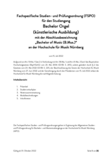for studies starting in winter semester 2022/23 Subject-specific study and examination regulations (German)
The subject-specific study and examination regulations form the legal basis for your degree programme. They contain all the information you need to know about your studies, including module descriptions and how your grades are calculated.
-
Bachelor KA Orgel (2022)
Size:357 KB pdf
What can I expect in this study area?
Professional field for which the course qualifies
The Bachelor's degree programme in Organ (performance) prepares students for a career that can be very individual.
Graduates typically work as freelance soloists, chamber musicians or in permanent positions as church organists, which places high demands on the graduate's artistic ability and personality, as well as their communication and marketing skills.
